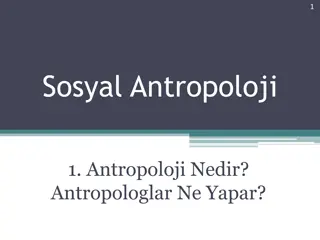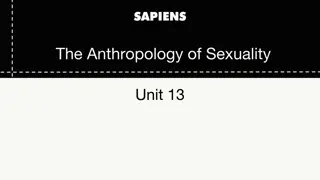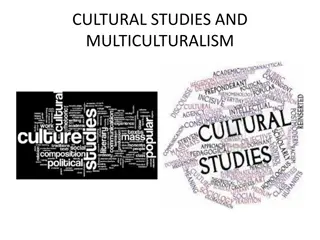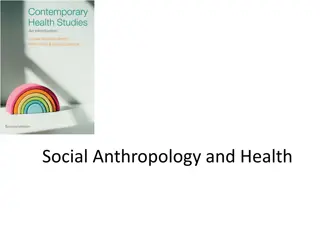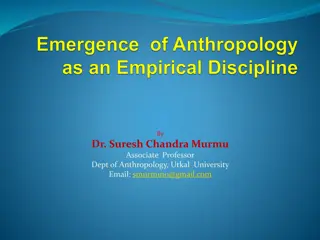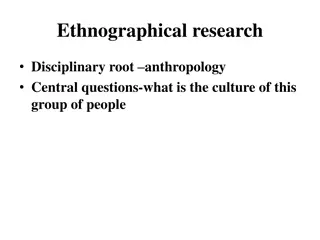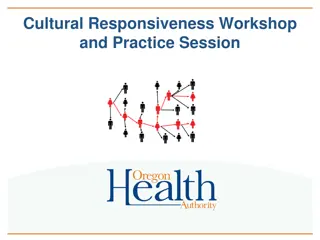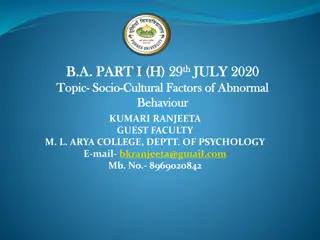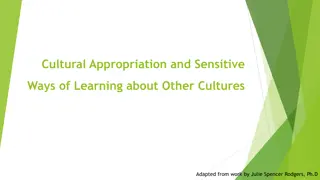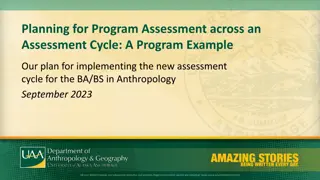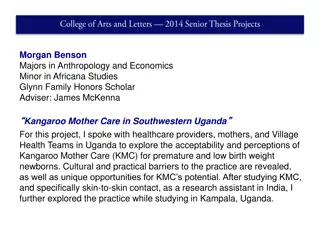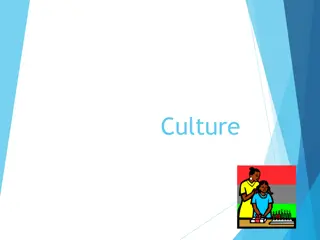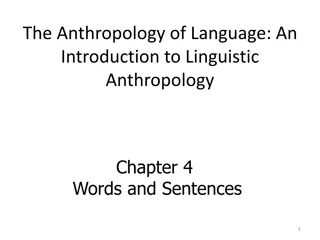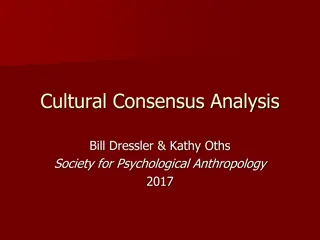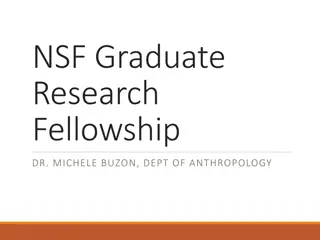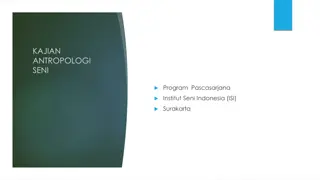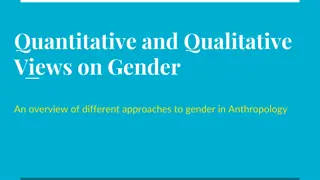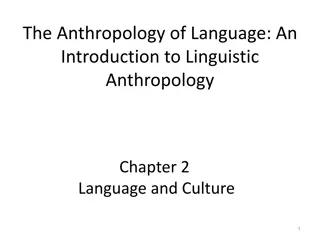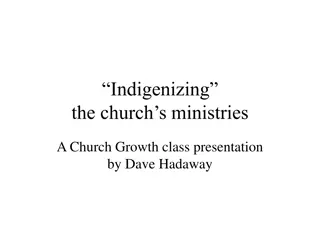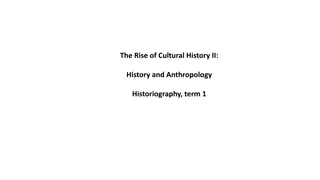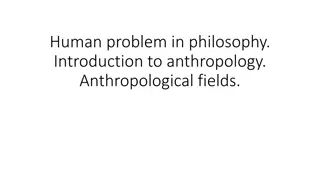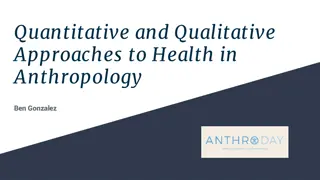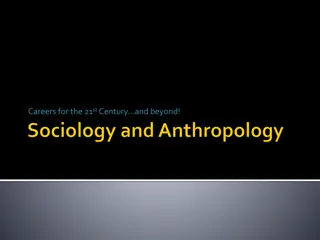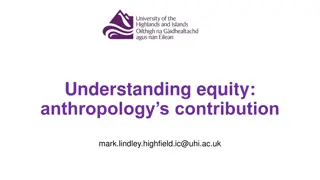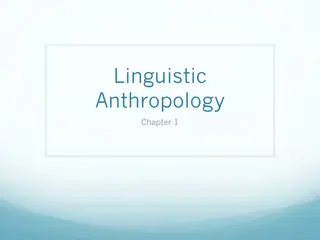Comparative Sociology
Comparative Sociology is a specialized branch that compares societies to provide generalizations, focusing on the structure and jurisdiction of groups and organizations. It involves studying affinities and disparities to predict outcomes. The discipline is closely related to Social Anthropology. Com
3 views • 15 slides
Explore Anthropology and Sociology at Our Department
Anthropology and Sociology departments offer culturally relevant classes addressing key societal issues such as race relations, health, migration, and more. Meet our renowned faculty members specializing in various anthropological and sociological fields of study. From urban anthropology to gender i
3 views • 17 slides
Introduction to Anthropology: What Anthropologists Do
Anthropology is the study of human societies and cultures to understand the various aspects of human existence and connections between different elements. It encompasses physical anthropology, linguistic anthropology, cultural anthropology, and social anthropology, delving into topics such as evolut
3 views • 21 slides
Anthropology of Sexuality
Delve into the anthropology of sexuality, examining how cultural, social, and historical factors shape human sexual behaviors and identities. Explore the challenges of studying sexuality across diverse cultural settings, and discover the influences of religion, societal norms, family, and media on s
6 views • 9 slides
Exploring Cultural Studies and Multiculturalism
Cultural studies is an interdisciplinary field that examines cultural differences while aiming to create a shared culture where diversity is respected. It challenges traditional views by studying all cultural productions and their societal contexts. Stuart Hall's work further delves into different p
0 views • 18 slides
Understanding the Intersection of Social Anthropology and Health
Social anthropology investigates the cultural and social dimensions of health, providing insights into how illness and medical care are shaped by cultural contexts. This discipline explores the impact of culture on individual health, highlighting how collective beliefs influence perceptions of healt
0 views • 20 slides
Evolution of Anthropology: From Herodotus to Modern Times
Anthropology has evolved over centuries, with roots tracing back to ancient Greeks like Herodotus. The discipline developed into a scientific field during the European Enlightenment and has since progressed to study the science of humanity and cultural differences. Philosophers like Plato and Aristo
1 views • 40 slides
Enhancing Short-Term Mission Effectiveness Through Cultural Anthropology Insights
Utilizing insights from cultural anthropology, this presentation delves into defining culture for short-term missions, viewing culture in successive levels, and key concepts such as cultural evolution and relativity. It explores the impact of culture on individuals and missions, emphasizing the impo
0 views • 16 slides
Understanding Ethnographic Research in Anthropology
Ethnographic research in anthropology focuses on studying cultures through direct observation in natural environments. It aims to gain insights into how users interact with their surroundings, providing in-depth understanding of social interactions, behaviors, and perspectives. Methods include direc
0 views • 22 slides
Exploring Cultural Responsiveness Through Workshops & Practice Sessions
This content provides a comprehensive guide on cultural responsiveness through workshops and practice sessions. It covers topics like cultural sensitivity, biases identification, and ways to reduce implicit biases. Resources, videos, and insights on cultural knowledge and awareness are shared to pro
0 views • 19 slides
Critics and Defenders in Multiculturalism Debate
Critics of multiculturalism argue that its focus on cultural inequalities diverts attention from socio-economic issues, while defenders like Kymlicka advocate for balancing cultural recognition with equal rights. Feminist critics raise concerns about cultural support for individual self-respect, par
0 views • 9 slides
Introduction to Socio-Cultural Anthropology: Understanding Human Societies
Explore the holistic study of mankind in Anthropology, delving into various branches, perspectives, and the scope of Social Anthropology. Learn about the relationship of Social Anthropology with other disciplines and its significance in understanding human societies.
1 views • 9 slides
Understanding Socio-Cultural Factors of Abnormal Behavior in Psychology
Exploring the impact of socio-cultural factors on abnormal behavior, this article delves into the influence of societal pressures, cultural norms, and economic status on mental health. The socio-cultural model emphasizes how societal criteria shape perceptions of abnormality, highlighting the role o
0 views • 7 slides
Understanding Cultural Appropriation and Respectful Cultural Learning
This content delves into the concept of cultural appropriation, offering definitions, examples, and ways to avoid it. It emphasizes the importance of cultural appreciation and outlines the differences between appropriation and appreciation, highlighting the power dynamics involved. Readers gain insi
1 views • 16 slides
Enhancing Cultural Competency in Behavioral Health Professionals
This e-learning program, developed by the HHS Office of Minority Health, focuses on improving cultural competence for behavioral health providers. It covers topics such as the connection between culture and behavioral health, the impact of cultural identity on client interactions, and strategies to
0 views • 9 slides
Understanding Craniofacial Superimposition Techniques in Forensic Anthropology
Craniofacial superimposition is a valuable technique used in forensic anthropology for identifying skulls by overlaying them onto photographs or videos of missing persons. The method involves various techniques such as Photographic Superimposition, Video Superimposition, and Roentgenographic Superim
6 views • 20 slides
Louisiana Cultural Districts: Engaging Communities in Cultural Development
The Louisiana Cultural Districts program, under the Cultural Economy Initiative, aims to revitalize local communities by creating hubs of cultural activity. By building on cultural resources and promoting art and culture, the program benefits from increased occupancy, commerce, and community identit
2 views • 18 slides
Forensic Anthropology and Missing Persons Investigation
The investigation into missing persons using forensic anthropology techniques, focusing on the analysis of bones like the humerus for height approximation and identification. Families await closure as the FBI looks into washed ashore bones, potentially bringing answers and resolving insurance claims
0 views • 13 slides
Implementing New Assessment Cycle for Anthropology BA/BS Program
This plan details the implementation of a new assessment cycle for the BA/BS in Anthropology program at UA, focusing on key elements such as required coursework mapping, program student learning outcomes, assessment based on a 7-year schedule, and submission deadlines for reports. The program aims t
0 views • 7 slides
Sex Determination Through Bone Analysis in Forensic Anthropology
In forensic anthropology, the pelvis and skull are crucial in sex determination, with additional assistance from femur, tibia, and humerus measurements. This data sheet guides on circling male or female based on traits like sub-pubic angle, pelvic cavity shape, eye orbit sharpness, zygomatic process
0 views • 33 slides
Understanding Triad Tests in Cognitive Anthropology
Triad tests are a valuable tool in cognitive anthropology, originally introduced by George Kelly in 1955. They involve presenting individuals with sets of three items and eliciting responses based on similarity or dissimilarity. This method allows researchers to explore differences in cognition acro
1 views • 27 slides
Diverse Academic Projects in Anthropology, Design, and Political Science
Students undertook research projects in varied fields - from exploring Kangaroo Mother Care in Uganda to blending traditional handicraft techniques with modern design, and examining civic education's role in democracy. Each project reflects unique interests and experiences across anthropology, desig
0 views • 19 slides
Anthropological Study of Religion: Exploring Cultural Diversity
This chapter delves into the anthropological study of religion, emphasizing cultural relativism and holism. It explores various branches of anthropology, such as cultural studies and archaeology, and discusses the holistic approach anthropologists take when studying smaller populations to understand
0 views • 34 slides
Understanding Cultural Diversity in Healthcare
The content explores the significance of cultural diversity in healthcare, emphasizing the increasing diversity of the population in the United States and the importance of cultural competence in nursing. It delves into cultural concepts, transcultural nursing, cultural context of health and caring,
0 views • 13 slides
The Anthropology of Language: Words and Sentences Overview
Explore the anatomy of language from morphology to syntax, delving into the structure of words, morphemes, and sentences. Understand the analysis of morphemes and their arrangements, the descriptions of bases forming words, kinds of bases like roots and stems, and creating a language from base forms
0 views • 31 slides
Understanding Cultural Consensus Analysis in Psychological Anthropology
Explore the essence of Cultural Consensus Analysis (CCA) as a significant aspect of psychological anthropology. Through ethnographic work and structured techniques, CCA helps verify shared knowledge within cultural domains and enhance the comprehension of cultural models. The model and steps involve
0 views • 64 slides
NSF Graduate Research Fellowship - Dr. Michele Buzon, Department of Anthropology
The NSF Graduate Research Fellowship, overseen by Dr. Michele Buzon from the Department of Anthropology, offers a stipend of approximately $34,000 along with $12,000 for the institution. The fellowship is open to U.S. citizens, nationals, and permanent residents. Eligibility criteria include having
0 views • 4 slides
Exploring Cultural Policy in the Mediterranean with a Focus on Malta
Delve into the intricate web of cultural relations in the Mediterranean region, centered around Malta. From historical and political insights to postcolonial influences and the role of cultural policy, this exploration sheds light on the complexities and nuances shaping the cultural landscape. Disco
0 views • 23 slides
Exploring Anthropology of Art: Perspectives and Studies on Cultural Expressions
This text delves into the intersection of anthropology and art, focusing on the importance of anthropological approaches in studying artistic subjects. It covers various topics such as the nature of art, methodologies, theoretical frameworks, and case studies. The discussed themes include the role o
0 views • 7 slides
Approaches to Gender Studies in Anthropology
This presentation provides an overview of qualitative and quantitative research methodologies in Anthropology focusing on Gender Studies. It explores topics like masculinity, homosociality, and gendered spaces, reflecting on the concepts of gender construction and performance. The research on frater
0 views • 13 slides
Exploring Language and Culture in Anthropology
Culture, as defined by various anthropologists, is a complex web of meaning that shapes human behavior and values. The distinction between emic and etic perspectives offers valuable insights into understanding different cultural contexts. Ethnosemantics delves into how vocabulary reflects native cat
0 views • 24 slides
Cranio-Facial Superimposition Techniques in Forensic Anthropology
Cranio-facial superimposition is a technique used in forensic anthropology to identify a skull by overlaying an image of the skull onto a photograph or video of a missing person's face. This method involves various techniques such as photographic, video, and roentgenographic superimposition. The pro
0 views • 20 slides
Enhancing Church Ministries Through Cultural Adaptation
Explore the concept of indigenizing church ministries through the lens of missionary anthropology and crossing cultural boundaries. Learn how to develop an indigenous strategy to convey the gospel effectively in diverse cultural contexts, illustrated by evangelism levels varying from one's own cultu
0 views • 27 slides
The Rise of Cultural History II: History and Anthropology Historiography
This content explores the concepts of cultural history, Marxist thought, cultural hegemony, and the works of Antonio Gramsci. It delves into the history of anthropology, discussing key figures such as Franz Boas and Malinowski, and highlights the intersection of anthropology and history in understan
0 views • 9 slides
Understanding Human Nature Through Philosophy and Anthropology
Explore the different perspectives on human nature through philosophy and anthropology, from ancient Greek philosophers like Aristotle to modern thinkers like Freud and Sartre. Delve into the intersections of theology, psychology, and cultural relativism in shaping our understanding of what it means
0 views • 12 slides
Approaches to Health Disparities in Anthropology: Quantitative vs. Qualitative Methods
Exploring health in anthropology involves various factors like social, cultural, biological, and linguistic influences. This content delves into the quantitative research on disparities in health insurance coverage, particularly focusing on Latino vs. white respondents in Texas. The study utilized l
0 views • 13 slides
Building Your Ideal Career with a Sociology/Anthropology Degree
Discover the diverse career opportunities offered by a Sociology/Anthropology degree, including skills development, research capabilities, and the exploration of social processes. Learn to assess your skills, interests, work environment preferences, and sense of purpose to guide your career path. Em
0 views • 29 slides
Understanding Equity in Anthropology: Contributions and Challenges
Anthropology plays a crucial role in understanding and addressing issues of equity, particularly in education. In Scotland, initiatives such as the Scottish Attainment Challenge and Pupil Equity Funding aim to bridge the gap in educational outcomes for pupils from disadvantaged backgrounds. While th
0 views • 16 slides
Understanding the Body, Soul, and Spirit Paradigm in Human Existence
Exploring the concept of ternary anthropology introduced by French anthropologist Michel Fromaget, which views humans as composed of body, soul, and spirit. This paradigm, rooted in both Eastern and Western traditions, delves into the ontological value of the mind and the overall human experience. T
0 views • 36 slides
Understanding Linguistic Anthropology and Anthropology: A Comprehensive Overview
Delve into the realm of linguistic anthropology and anthropology to explore the study of humans, culture, language, biology, artifacts, and more. Discover the four fields of anthropology, the holistic approach, and the importance of cultural relativism while avoiding ethnocentrism. Learn how linguis
0 views • 25 slides


